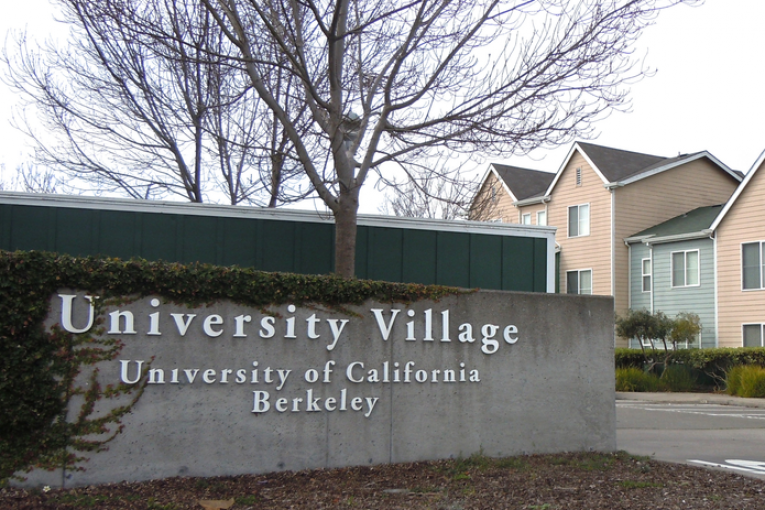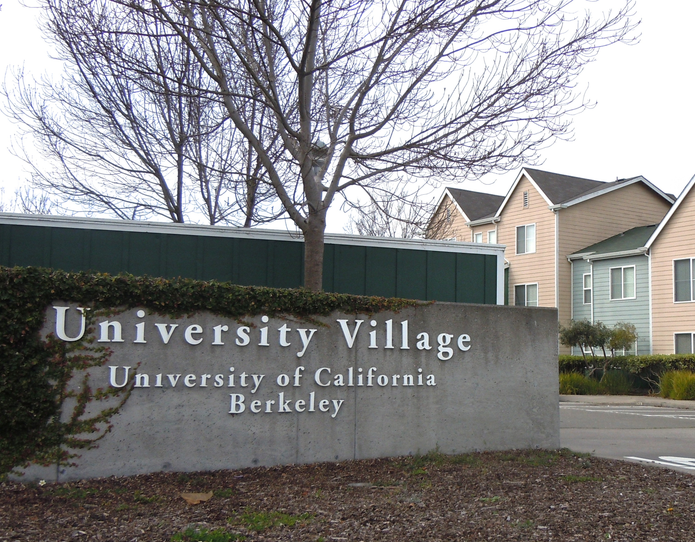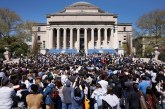

By CJ Jackson
ALBANY— “Berkeley cannot guarantee there will not be evictions.” This is what the student families of University Village were told in a meeting with an attorney from their college.
Sam Muell, a University Village resident and the founder of the University Village Tenant’s Union, elaborated on the meeting— one which left students no less apprehensive about losing their homes during the pandemic.
Muell explains that while UC Berkeley has refunded some portion of housing contracts to students living in dorms, the university has been less forgiving for its family housing residents.
As it stands, students living in campus-owned apartments that have fallen behind on rent due to Covid-19 will not receive any future relief from the University.
University Village, Albany, consists of 975 apartments ranging from studio to three bedroom layouts. These apartments are for UC Berkeley students that are married, in a committed relationship, single parents, or married/committed with children.
Students with families have had to balance their own Zoom classes, their dependents undergoing online learning, lost income, as well as various time constraints. Because of these numerous responsibilities, University Village students have been disproportionately impacted by the COVID-19 pandemic.
While the Tenants Union formed in Jan. 2020 in order to protest the monthly rents in University Village, COVID-19 prevented the planned rent strike.
According to the Union, the average rent in University Village is comparable to the Albany area’s monthly rental rates. However, UC Berkeley is exempt from property taxes. The university is also free from the regulatory fees which most landlords are obligated to pay agencies.
UC Berkeley is not burdened by these extra costs and yet maintains rental rates on par with other landlords, Muell explains.
The Tenants Union conducted a survey of 150 residents concerning rent burden before and after the first shelter-in-place order. Prior to the COVID-19 pandemic, 45.5% of students in University Village paid 60%-100% of their income to rent each month, 9.7% of residents reported they were taking on debt in order to pay rent before the lockdown, and only 6.2% of student residents paid 30% or less of their income on rent.
Given that NBC states, “as a general rule, you want to spend no more than 30 percent of your monthly gross income on housing,” these statistics already give significant cause for concern. But the numbers have only worsened as coronavirus ravages the area.
A follow-up study in April 2020 (amidst the pandemic) discovered that 24.8% of students were taking on debt in order to pay the monthly rent (an increase of 15.1%), 44.1% of students spent 60%-100% of their income for rent, and only 4.8% paid 30% or less of total monthly income for rent.
The survey results indicate that many students in University Village are likely facing the choice of either paying their rent or obtaining basic necessities such as food.
Those struggling for food have limited options. While U.C. Berkeley does offer a food pantry for basic food needs and a family services center, the pantry’s services are dependent on donations.
Inventory is not guaranteed, and in light of the coronavirus pandemic, it has become even more difficult to organize in-person donation drives. University Village families’ access to resources has become increasingly precarious.
Thus far, UC Berkeley has followed the California law concerning rent moratorium. Legally, however, the institution is exempt from doing so.
The California Constitution states that, “the University of California shall [be]…subject only to such legislative control as may be necessary to insure the security of its funds and compliance with the terms of the endowments of the university.”
Additionally, the rent moratorium laws which UC Berkeley has been following are set to expire June 30, 2021. As a result, students in family housing who are struggling to pay their rent are increasingly worried that they will be subject to eviction.
At the last Tenants Union meeting in Dec. 2020, Muell stated U.C. Berkeley “sent an attorney to tell us they cannot guarantee no evictions.”
Muell continued, “he [the attorney] said it’s not fair to new students if we keep students that owe back rent in an apartment while they wait for one.”
At the meeting, Muell asked, “couldn’t Berkeley just forgive the debt?” The attorney replied, “that would be against student equality. It wouldn’t be fair to students in private residences.”
As of Feb. 2021, a significant portion of University Village apartments remain empty, suggesting no significant housing shortage.
Muell continued, “the attorney told us that student equity and fairness prevented U.C. Berkeley from helping them as a group [but] he suggested individual members come to campus and speak privately with administrators [after] a visit to a student welfare office of some sort.”
The attorney’s statements, relayed through an interview with Muell, have also been corroborated by several other members of the Union who wished to remain anonymous.
The University Village Tenants Union is in the process of planning further meetings with the campus administration. They hope to dissuade the possibility of evicting students who have fallen behind on rent due to COVID-19.
CJ is a writer for The Vanguard at Berkeley’s social justice desk. He is a senior at Cal in the Legal Studies department. He is from Jersey City, New Jersey.
To sign up for our new newsletter – Everyday Injustice – https://tinyurl.com/yyultcf9
Support our work – to become a sustaining at $5 – $10- $25 per month hit the link:






